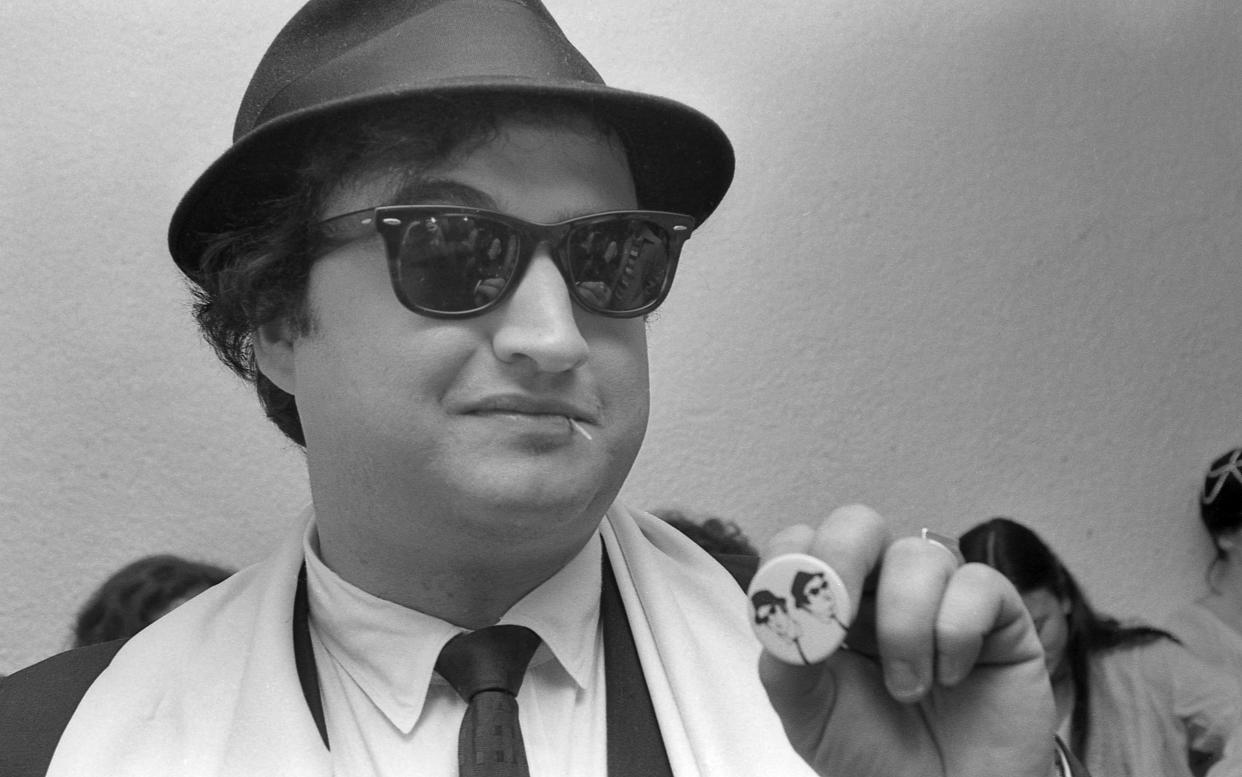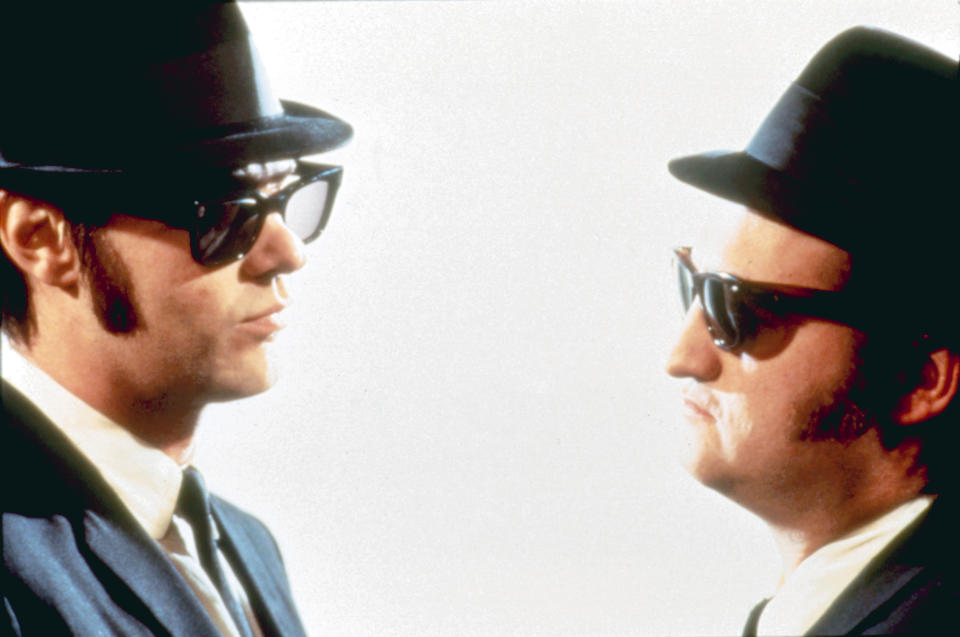'Belushi' director reflects on the comedian's legacy: 'His life was nothing if not complex'

- Oops!Something went wrong.Please try again later.
- Oops!Something went wrong.Please try again later.
- Oops!Something went wrong.Please try again later.
John Belushi died of a drug overdose in 1982, but his comic spirit lives on whenever comedy lovers re-discover his work, whether it’s through classic episodes of Saturday Night Live or drive-in double bills of Animal House and The Blues Brothers. Contemporary viewings of the comedian’s old hits can also be a double-edged (samurai) sword, though. Even as you’re laughing at Belushi’s antics, you might also experience a sense of sadness as you notice signs of the personal demons that resulted in his early death.
“It’s tough to watch the moments in The Blues Brothers where you can see he’s not doing well,” admits R.J. Cutler, director of the new documentary, Belushi. “But he was also doing well for a lot of his life — a lot of the comedy you see in Animal House and Saturday Night Live was happening [without drugs]. I think you’re putting your finger on a great complexity, and his life was nothing if not complex.”

Premiering on Nov. 22 on Showtime, Belushi eschews standard-issue talking head interviews for a collage of archival news footage, home movies, vintage scenes from the big and small screen and new animated segments. All of this imagery is accompanied by the voices of Belushi’s family, friends and colleagues that were preserved on tapes recorded by Tanner Colby, who published the oral history Belushi: A Biography in 2005.
Colby produced that book in collaboration with Belushi’s widow, Judith Belushi Pisano — one of the few people that Cutler interviewed for the film. “When I started working on the film, I wanted to get a sense of the stories that people had to tell,” he explains. “And I found most of what everyone had to say to be lost in the foggy haze of memory, as opposed to immediate and raw. It was like, ‘These are my stories about John Belushi that I’ve told 10,000 times. That’s not what I was looking for.”
Fortunately for Cutler, Colby’s tapes were filled with the kind of raw storytelling he knew would animate his documentary, whether it was Dan Aykroyd revisiting Belushi’s final days or the late Carrie Fisher — who also famously wrestled with drug addiction — discussing the excesses of the era in frank terms. “The tapes had hundreds of hours of raw material. I was so struck by Jim Belushi talking about his big brother; so moved by Carrie Fisher’s insights into the nature of addiction; and so compelled by Dan speaking so beautifully about the nature of his relationship with John. It was all really, really exciting to me.”
Cutler also drew on his own childhood memories of Belushi, who he remembers hearing for the first time on the National Lampoon Radio Hour when he was 13 years old. The future documentarian followed the comedian from Lampoon to SNL when it debuted in 1975. “Like so many others, my mind was blown,” he says of those not-ready-for-primetime early seasons of NBC’s late-night institution. “I had never seen anything like it, and in the midst of it all was this guy, John Belushi. Everyone on the show was funny, but John was the kind of exposed wire that you couldn’t help but be attracted to, while also recognizing the danger in the anarchic spirit he represented.”
But as we know now, that anarchic spirit was fueled by a casual drug habit that grew increasingly serious as Belushi’s star rose in the wake of Animal House’s blockbuster success. “I’m not saying anything particularly original here, but I think a lot of comedy comes from a place of pain, and finding ways to mitigate that pain is not uncommon,” Cutler says. “A lot of those guys were kids in the ‘60s when drug use was seen as recreational, and the implications for someone who was an addict were not completely understood. So recreational drug users who suffered from addiction didn’t necessarily know that they were setting themselves on a destructive path.”
Belushi’s addictions came to a head on The Blues Brothers, which celebrated its 40th anniversary over the summer. Reflecting on the film four decades later, Aykroyd told The Guardian that cocaine was omnipresent on the movie’s Chicago set. “At the time, cocaine was a currency. For some of the crew working nights, it was almost like coffee. I never liked it myself but I wasn’t going to police others’ behavior,” he said, adding that the rampant drug use irritated the movie’s director, John Landis. “Sometimes he didn’t know whether we were going to show up for work after the parties.”

Landis is heard in Belushi commenting on the star’s off-screen behavior. “There was a lot of indulgence and excess, even though John and Dan were at their peaks of life,” Cutler acknowledges. “The thing about John Belushi is that he was always reinventing himself, and trying something new. As a sketch comedian his greatest achievements were on SNL; as a comedic actor his greatest achievement was Animal House; and as a performance artist his greatest achievement were all the manifestations of the Blues Brothers.”
As Cutler’s film illustrates, Belushi did get clean in the wake of The Blues Brothers, and sought to reinvent himself again, accepting more challenging roles in films like the darkly funny Neighbors and the romantic comedy Continental Divide. But difficult working experiences, negative reviews and Hollywood’s indifference to his passion projects contributed to the relapse that eventually resulted in his fatal overdose. Asked where he thinks Belushi’s career might have gone had he lived, Cutler admits that he can’t predict what the comedian’s present-day filmography would look like. “People always ask ‘How would Wilt Chamberlin be if he was playing basketball today?’ Those are fun things to think about, but I’m not quite sure. I don’t know what John would be doing now.”
Belushi’s legacy is arguably felt most strongly at SNL, which has seen numerous Not Ready for Primetime Players anointed as the next John Belushi over the show’s 46 (and counting) seasons. And some of those performers have perhaps taken the comparison too far. Chris Farley famously felt a kinship with Belushi, and channeled both his onscreen anarchic spirit and his off-screen excesses. (Farley died of a drug overdose in 1997, fifteen years after Belushi’s passing.)
“I don’t want to judge other people and what they may or may not have learned [from John],” Cutler says of performers like Farley. “I suspect their desire to see themselves in him is a desire to see themselves in one of the greatest comedic geniuses of all time. So I don’t think of this film as a corrective: The story we tell is a story about John, not about the lessons others may have taken from him. And John Belushi was John Belushi: a visionary who suffered from addiction at a time when the resources that are available now weren’t available. That’s what this film is about.”
Belushi premieres Sunday, Nov. 22 at 9 p.m. on Showtime.
Read more from Yahoo Entertainment:

